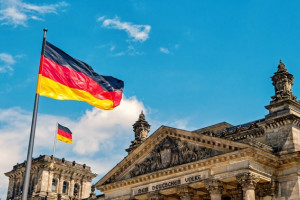2021: Ecommerce in Germany worth €99 billion

German ecommerce has gone through a strong growth in 2021. Gross sales of ecommerce products amounted to 99.1 billion euros, which is a growth of 19 percent compared to 2020. Almost every seventh euro available to German consumers for household expenses was spent on products online.
In 2020, ecommerce in Germany was worth 83.3 billion euros, which was a 14.6 percent growth when compared to the year before. The growth of 19 percent this year is thus significantly higher. When digital services are counted, the total worth of ecommerce even reaches 107.1 billion euros.
‘Ecommerce has become the new normal’
The significant growth in gross sales of goods in German ecommerce shows that ecommerce has become ‘normal’ in the country, according to ecommerce association Bevh. “The corona pandemic continues to put society and trade in a state of emergency, but digital trade is bringing back a bit of normality with the secure supply of goods.
‘Trade without ecommerce is unthinkable.’
Ecommerce is increasingly perceived as normal and usual. Its growth is stabilizing at a high level after spikes at the beginning of the pandemic, showing that its benefits, such as greater choice and better service, are here to stay. Trade without ecommerce is already unthinkable, neither for consumers nor for retailers”, explains Gero Furchheim, President of Bevh.
Increased order frequency
At least 96.3 percent of shoppers were ‘satisfied’ and ‘very satisfied’ with their orders. Additionally, 40.9 percent of respondents stated that they had ordered online more than once in the past seven days. In 2020, this proportion was 39.7 percent. “Never before have German shoppers bought so many products online and at the same time expressed such high levels of satisfaction.”
Mcommerce on the rise
A good 40 percent of all ecommerce sales were generated on mobile devices in 2021, as the sales volume of mobile ecommerce increased by 56.5 percent to 39.9 billion euros. In 2020, sales generated by mobile devices were at 28.1 billion euros, which was one third of all ecommerce sales.
‘Sales volume of mcommerce increased by 56.5% in 2021.’
This shows that mcommerce is on the rise with German consumers. In two out of three cases, 14 to 29-year-olds purchased their products via smartphone or tablet. Search engines and online shops remain the most import information channels for making a purchase decision, but they are followed by social media and apps.
Sales growth pure online players 18%
In Q3 2021, it already became apparent that direct sales (D2C) from manufacturers were able to increase their sales the most. Multichannel retailers recorded a sales growth of 16.7 percent in 2021. Their growth wasn’t as strong as that of pure internet players who reached 18.4 percent. In 2020, pure internet players reached a sales growth of 9.5 percent.
When looking at where most purchases were made, with gross sales of 50.5 billion euros, marketplaces accounted for more than every second euro in German ecommerce. Grocery, drugstore goods and pet supplies were still increasingly popular online products with a sales increase of 36.4 percent. However, in 2020 this growth reached 40.9 percent. Overall, the growth of individual products groups seems to have leveled off in 2021 to slightly above the long-term average.
‘Gross sales above €110 in 2022’
For the coming year, ecommerce association Bevh expects that digital traders will further increase their sales. For 2022, the organization assumes that sales of goods will increase by 12 percent and generate gross sales of more than 110 billion euros.
‘It’s important not to restrict the development of our industry in legislation.’
“We very much welcome the commitment of the new federal government to digitization and ecommerce in Germany, as we find it in the coalition agreement. It is now important not to unreasonably restrict the development of our industry through one-sided burdens, excessive formalism and the fear of its success enshrined in legislation. We would like to have the courage to focus on the future of retail instead of preserving traditional structures – in Germany and in Europe.”

Comments